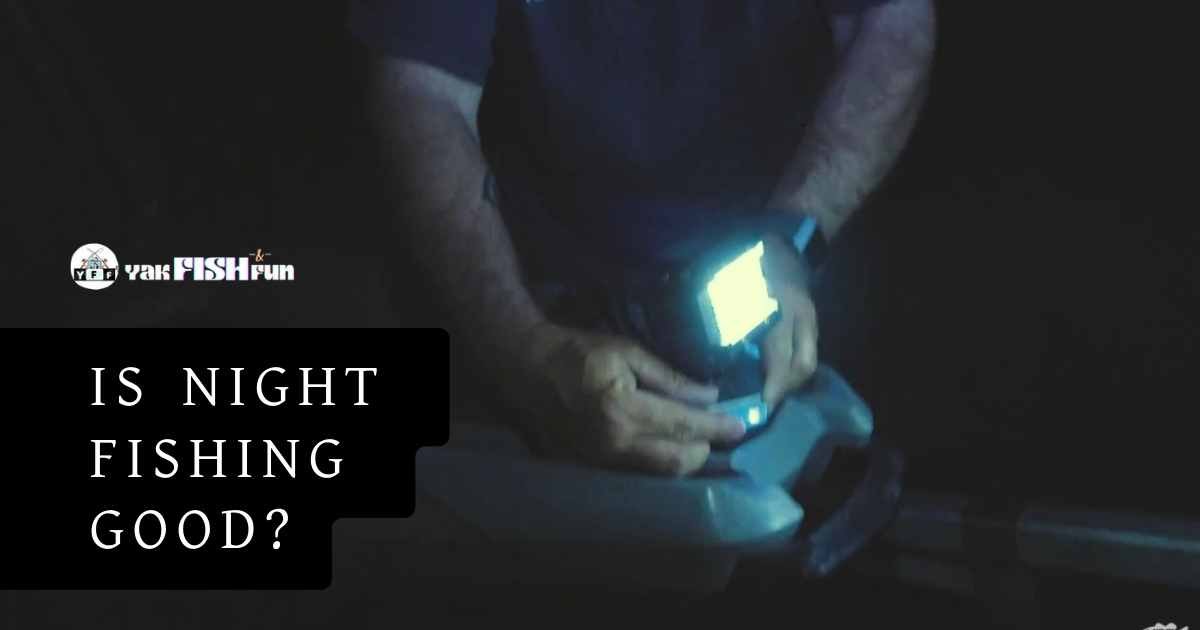Night fishing offers a unique and often thrilling experience for anglers looking to explore fishing beyond the daylight hours. With cooler temperatures, reduced fishing pressure, and different fish behavior patterns, night fishing can present opportunities that aren’t available during the day.
But is night fishing good? Yes, night fishing is good. It offers unique advantages and can lead to successful catches.
Night fishing provides a serene and calm environment, away from daytime crowds and noise. Fish tend to be more active during the night, especially during warmer months, as the water cools down. Predatory fish, like bass and catfish, often hunt at night, increasing the chances of a catch.
In this article, we’ll delve into the advantages, potential drawbacks, and tips for making the most of your nocturnal fishing adventures. So, if you’re considering trying night fishing or just want to understand its potential, read on to discover why fishing under the stars might be your next great adventure.
Table of Contents

Advantages Of Night Fishing
Fishing at night can be an exhilarating experience. The cool breeze, the quiet environment, and the thrill of the unknown make it unique. Night fishing offers several advantages that can enhance your fishing adventure. Let’s explore some of the key benefits of night fishing.
Increased Fish Activity
One of the major advantages of night fishing is the increased fish activity. Many fish species are more active during the night. This is due to the cooler temperatures and reduced light, making them feel safer. Here are some reasons why fish are more active at night:
- Cooler Temperatures: Fish tend to be more active in cooler water, which occurs at night.
- Reduced Light: Less light means fish are less wary and more likely to bite.
- Feeding Habits: Some fish species feed more during the night, increasing your chances of a catch.
Additionally, the moonlight can play a role. On full moon nights, fish can see better and are more likely to hunt. This makes night fishing a prime time for catching larger fish. Below is a table showcasing the fish activity during different moon phases:
| Moon Phase | Fish Activity |
| New Moon | Moderate |
| First Quarter | High |
| Full Moon | Very High |
| Last Quarter | High |
Less Competition
Night fishing often means less competition. Most anglers prefer fishing during the day, leaving the waters less crowded at night. This solitude can enhance your fishing experience in several ways:
- Peaceful Environment: Enjoy the calm and quiet, with fewer boats and anglers around.
- Better Spots: With fewer people, you can access prime fishing spots more easily.
- More Fish: Less competition means more fish for you to catch.
The reduced human activity also means less noise and disturbance in the water. Fish are less spooked and more likely to bite. This increases your chances of a successful fishing trip. Below is a comparison of day and night fishing in terms of competition:
| Time | Competition Level |
| Day | High |
| Night | Low |
Different Species
Night fishing offers the opportunity to catch different fish species. Some fish are nocturnal and are rarely seen during the day. Here are some examples:
- Catfish: Known for their night feeding habits, catfish are a common catch at night.
- Walleye: This species prefers low-light conditions and is more active after sunset.
- Striped Bass: Often hunt at night, making them a prime target for night anglers.
These species have adapted to the night for various reasons, including feeding and avoiding predators. Catching these fish can be a thrilling experience. Below is a table showing the common night species and their preferred bait:
| Fish Species | Preferred Bait |
| Catfish | Chicken Liver, Stink Bait |
| Walleye | Nightcrawlers, Minnows |
| Striped Bass | Shad, Eels |
Trying night fishing can add excitement to your fishing routine. The chance to catch different species makes it worthwhile.
The 7 Best Practices For Night Fishing
Night fishing can be an exhilarating experience, offering a unique challenge and the potential for great rewards. The darkness brings out a different set of fish behaviors, and understanding the best practices for night fishing can make a significant difference. Here are some key strategies to maximize your night fishing success.
#1. Pay Attention To Moon Phases
Moon phases play a crucial role in night fishing. Fish are more active and visible during certain phases of the moon, particularly during the full moon and new moon. Here’s why:
- Full Moon: Increased light allows fish to see better, making them more active.
- New Moon: The darkness encourages fish to move into shallower waters.
Using a lunar calendar can help you plan your fishing trips around these phases. Studies show that fish feeding times align with moonrise and moonset. Anglers often find success during these periods.
To illustrate, consider this table on moon phases and fish activity:
| Moon Phase | Fish Activity |
| Full Moon | High Activity |
| New Moon | Moderate Activity |
| Quarter Moons | Low Activity |
#2. Using Glow-in-the-dark Lures
Glow-in-the-dark lures are essential for night fishing. They attract fish that are drawn to light. These lures can be charged using a flashlight or natural sunlight. Here are some tips:
- Use bright colors: Bright greens and blues work well.
- Charge lures frequently: Keep them glowing to maintain attraction.
Glow-in-the-dark lures mimic bioluminescent prey, making them irresistible to many fish species. Consider adding a small light source to your tackle box to keep your lures charged.
For best results, combine these lures with natural bait. This combination can increase your chances of a successful catch.
#3. Fishing Near Structure
Fish are attracted to structures such as docks, piers, and submerged logs. These structures provide shelter and attract smaller prey. Here are some advantages of fishing near structures:
- Shelter: Fish feel safe and are more likely to be active.
- Food: Structures attract smaller fish and insects, which in turn attract larger fish.
Using sonar or fish finders can help locate these structures. Position yourself to cast near or under these areas for the best results. Patience is key, as fish may take time to emerge from hiding.
#4. Be Patient
Patience is vital in night fishing. Fish behaviors are different at night, and they may take longer to approach your bait. Here are some tips to stay patient:
- Stay calm: Avoid making sudden movements.
- Watch and wait: Pay attention to subtle signs of fish activity.
Bring a comfortable chair and dress warmly to stay comfortable. Patience often leads to bigger and better catches. Remember, the quietness of night fishing can be soothing, making the wait worthwhile.
#5. Go Slow
Going slow is crucial for night fishing. Fish are more cautious in the dark and may be spooked by fast movements. Here are some tips:
- Slow retrieval: Reel in your line slowly to mimic natural prey movements.
- Gentle casting: Avoid splashing to prevent scaring fish.
Slow and steady movements increase your chances of attracting fish. Experiment with different retrieval speeds to find what works best.
Using lightweight tackle can also help control your movements, making them smoother and less disruptive.
#6. Maintain Stealth
Stealth is essential for night fishing. Fish are sensitive to noise and light. Here are ways to maintain stealth:
- Minimize noise: Avoid loud conversations and movements.
- Use dim lights: Bright lights can scare fish away.
Wearing dark clothing can help you blend into the surroundings. Use soft footsteps and gentle movements to avoid startling fish. The quieter and less obtrusive you are, the better your chances of success.
#7. Bring Adequate Lighting
Lighting is important for night fishing, but it should be used wisely. Too much light can scare fish, while too little light can be unsafe. Here’s a balance:
- Headlamps: Keep your hands free while providing focused light.
- Lanterns: Use dimmable lanterns to control light levels.
Red or green lights are less likely to scare fish. They also help preserve your night vision. Ensure you have backup batteries or a portable charger to avoid running out of light.
Safety is also a concern. Adequate lighting can prevent accidents and ensure you can handle your gear properly.
Mistakes To Avoid When Fishing In The Dark
Night fishing can be an exhilarating experience, offering a unique opportunity to catch fish under the stars. However, many anglers make common mistakes that can ruin their night fishing adventure. Understanding these mistakes and learning how to avoid them can make your night fishing trip more enjoyable and successful.
Using Excessive Noise
One of the biggest mistakes anglers make is creating too much noise. Fish are sensitive to sound, especially at night. Here are some tips to keep noise levels down:
- Turn off loud music: Fish can hear and feel vibrations. Loud music from a radio can scare them away.
- Use soft-soled shoes: Hard-soled shoes can create a lot of noise on a boat or dock. Soft-soled shoes help minimize this.
- Handle equipment quietly: Be mindful of how you handle your fishing gear. Clanging and banging can alert fish to your presence.
Creating a quiet environment increases your chances of catching fish. Remember, the quieter you are, the better your chances of success.
Overlooking Safety Measures
Safety should always be a priority when fishing at night. Many anglers overlook important safety measures, which can lead to dangerous situations. Here are some crucial safety tips:
- Wear a life jacket: Even if you are a strong swimmer, a life jacket is essential. Accidents can happen, and it’s better to be safe.
- Bring a flashlight: A good flashlight helps you see in the dark and can be a lifesaver in emergencies.
- Inform someone of your plans: Always let someone know where you are going and when you expect to return.
Following these safety measures helps ensure a safe and enjoyable night fishing experience.
Neglecting To Bring Bug Spray
Nighttime can bring out a host of insects, and neglecting to bring bug spray can make your fishing trip miserable. Here are some reasons why bug spray is essential:
- Prevent insect bites: Mosquitoes and other bugs can be a major annoyance. Bug spray helps keep them at bay.
- Reduce the risk of disease: Insects can carry diseases. Bug spray reduces your risk of getting bitten and potentially infected.
- Stay focused: Constantly swatting at bugs can distract you from fishing. Bug spray helps you stay focused on the task at hand.
Always pack bug spray in your fishing gear. A few sprays can make a big difference in your comfort and enjoyment.
Night Fishing Regulations In The US
Night fishing can be an exhilarating and rewarding experience. The tranquility of the night, the sounds of nature, and the thrill of the catch make it a favorite for many anglers. However, it’s essential to be aware of night fishing regulations to ensure a safe and enjoyable outing. Understanding and adhering to these rules helps protect fish populations and preserves the natural environment.
Regulations vary significantly by state. Ignoring these regulations can lead to hefty fines or even the suspension of your fishing license.
- Fishing Times: Some areas restrict fishing to certain hours, even at night.
- Permissible Gear: Ensure your equipment complies with local laws.
- Protected Species: Identify which species are off-limits to avoid penalties.
Here are some highlights from a few states:
California: Night fishing is generally allowed, but specific restrictions may apply depending on the body of water. For example, salmon fishing in the Central Valley rivers has specific seasonal restrictions due to conservation efforts.
Delaware: Night fishing for trout in designated streams and ponds is prohibited from one and a half hours after sunset to one and a half hours before sunrise. Additionally, boats used at night must have an electric distress light that meets U.S. Coast Guard standards.
Florida: There are no statewide laws prohibiting night fishing. However, individual water bodies might have specific regulations. Non-game fish can be taken at night using a bow and arrow or gigs.
Georgia: Night fishing is generally allowed in public fishing areas, with exceptions like certain lakes and rivers where trout fishing is restricted at night. Bow fishing for non-game fish is permitted at night in reservoirs of 500 acres or larger.
Michigan: Night fishing is permitted, but certain rules and regulations must be adhered to, which can be found in the Michigan DNR’s fishing guidebooks.
North Carolina: Night fishing is generally allowed, but it’s crucial to consult the North Carolina Wildlife Resources Commission’s regulations for specific rules and updates.
Utah: Night fishing is permitted, and anglers are encouraged to check the Utah Fishing Guidebook for specific laws and rules governing fishing activities.
Washington: Anglers need to consult the Washington Department of Fish & Wildlife’s annual fishing pamphlet and any emergency rule changes for up-to-date information on night fishing regulations.
Observe Catch And Release Policies
Many regions enforce catch-and-release policies to sustain fish populations. These policies require anglers to release certain species or sizes of fish back into the water. Observing these rules is essential for the health of aquatic ecosystems.
- Handle Fish Carefully: Use wet hands or gloves to avoid harming the fish.
- Use Barbless Hooks: Barbless hooks make it easier to release fish without injury.
- Minimize Air Exposure: Keep the fish in the water as much as possible.
Here is a quick guide to follow:
- Use a rubberized landing net to minimize damage.
- Remove the hook gently using pliers.
- Revive the fish by holding it in the water until it swims away.
Following these guidelines helps ensure the fish survive after release. This practice supports sustainable fishing, allowing future generations to enjoy the sport.
Respect The Environment
Respecting the environment is crucial during night fishing. The natural surroundings are home to various wildlife and must be preserved for future enjoyment. Here are some essential practices to follow:
- Leave No Trace: Take all your trash and belongings with you.
- Avoid Loud Noises: Keep noise levels down to not disturb wildlife.
- Use Biodegradable Products: Opt for biodegradable bait and lures.
What Bait Is Best For Night Fishing?
Live bait like nightcrawlers, minnows, and shad works best for night fishing. Glow-in-the-dark lures also attract fish.
Is Night Fishing Good For Bass?
Yes, night fishing is good for bass. Bass are more active and feed aggressively at night. Cooler temperatures also make them more comfortable. Use dark or noisy lures for best results.
Bottom Line
Night fishing can be a thrilling and rewarding experience. It offers cooler temperatures, fewer crowds, and different fish behaviors. Although it has challenges like poor visibility and the need for special gear, the benefits can make it worth trying. With the right preparation, you can enjoy successful night fishing. If you’re ready for a new adventure and don’t mind fishing in the dark, give night fishing a go and enjoy the excitement of angling under the stars.


